Americans Golden In Lead And Speed at Edinburgh World Cup. Records Smashed. Results.
- Oops!Something went wrong.Please try again later.
- Oops!Something went wrong.Please try again later.
- Oops!Something went wrong.Please try again later.
This article originally appeared on Climbing
This weekend's Lead and Speed World Cup in Edinburgh, Scotland, was a late addition to the IFSC's World Cup calendar, added in part to make up for cancelled World Cups in China. It was also marked by some extremely unique context. For starters, the onset of the event was marked by a statement from the IFSC recognizing the passing of Queen Elizabeth II and stating that the Edinburgh World Cup would "go ahead as scheduled." Then, the ensuing Speed finals featured a bagpipe performance and a moment of silence in honor of the Queen. Furthermore, the subsequent Lead discipline happened to be contested on the same day that the Queen's coffin was traveling from the Scottish estate of Balmoral Castle to...Edinburgh.
Aside from those royal circumstances, this Edinburgh World Cup possessed heavy intrigue following last weekend's Koper World Cup--where Japan's Ai Mori won the gold medal in something of an upset victory over the season's gold medal stalwart, Janja Garnbret of Slovenia. Questions abounded: Would Mori win again? Would Garnbret, widely considered the G.O.A.T., surge back to reclaim the top spot? Would someone else steal the headlines altogether?
It all amounted to the Edinburgh World Cup being far more special and significant than originally expected.
Team USA stands out in Speed
An early highlight of the Speed discipline, particularly for American fans, was a new American record set by Emma Hunt in the qualification portion of the women's division. Hunt's time of 7.02 seconds bettered her own previous record by 0.03 seconds, but just as important was that the new historic time vaulted her comfortably into the finals. There, Hunt cruised through the elimination bracket with a series of victories--first over China's Guizhen Xie, and then over China's Yufang Xie.
But Hunt was not done making history. She broke her own American record again in that race against Yufang Xie (clocking a time of 6.88 seconds, breaking the hallowed 7-second barrier in the process), and eventually set another American record--yes, again--in a resultant semi-final race against Poland's Aleksandra Kalucka (with a time of 6.84 seconds). Kalucka managed to earn the narrow victory in the race (by just 0.01 seconds) and eventually beat her own sister, Natalia Kalucka, to win the gold medal in the Big Final race. But Hunt garnered some hardware too, edging out Italy's Giulia Randi for the bronze medal in the Small Final.
The men's Speed division had its own share of highlight-reel moments in the qualification portion, including solid runs by Americans Joe Goodacre, Richard Li, Noah Bratschi, John Brosler, and Samuel Watson. All five Americans advanced to the finals, where Watson and Goodacre kicked off the proceedings with a highly anticipated head-to-head race. Watson surged to victory while Goodacre rallied from a costly low slip. In fact, Watson soon surged to victories in other races as well, beating South Korea's Yongjun Jung and Italy's Gian Luca Zodda as the elimination bracket funneled down to a Big Final race between Watson and China's standout, Jinbao Long. While Long struggled to ease into a smooth rhythm during the sprint, Watson smoothly rocketed to the top of the wall in 5.97 seconds. The efficient run earned Watson the gold medal. Long took the silver, and Spain's Erik Noya Cardona beat Italy's Zodda in a Small Final race for the bronze.
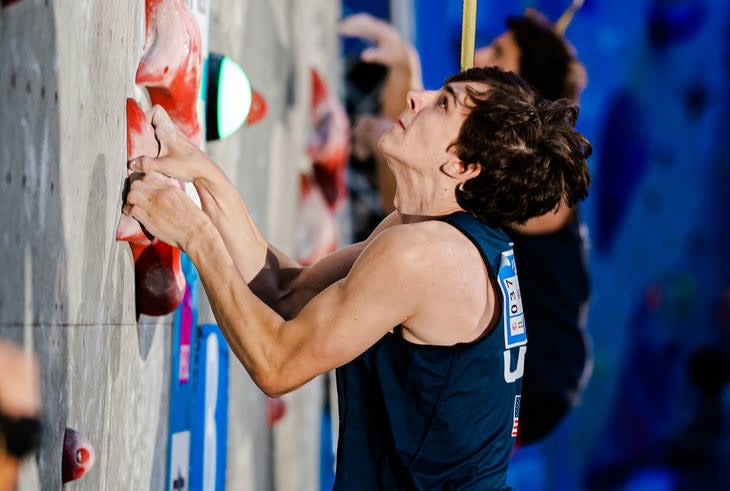
Americans have long excelled in Speed, but Watson was the first American to win a World Cup gold medal in the discipline. Furthermore, at just 16 years old, Watson is the youngest ever to do so. (Ukraine's Maksym Styenkovyy previously held the designation, winning a Speed World Cup at 17 years old in 2000 in Nantes, France.) This makes Watson the unofficial leader of a whole new generation of talented and motivated young competitors in the Speed discipline.
Grupper Grabs another gold
The men's Lead discipline kicked off with tight scores in the qualification round. Members of Team Japan (Taisei Homma and Ao Yurikusa) were the early leaders on the scorecards, but American Jesse Grupper clawed to the top of the pack as well by topping one of the qualification routes, as did compatriot Colin Duffy. However, in the semi-finals that followed, Homma and Yurikusa both found themselves stalled out by a dynamic crux at the 25+ mark, while Grupper, in particular, surged through that crux sequence (which bottlenecked 11 competitors in total) as the crowd cheered wildly. Slovenia's Luka Potocar also managed to reach the upper section of the semi-finals route and even pushed three moves higher than Grupper before falling while lunging for the top hold.
Much of the intrigue for the finals, then, revolved around Grupper and Potocar battling it out. But the round had other plot points as well. For example, Japan's Yoshiyuki Ogata set an impressive high point of 31+ early in the round but was downscored (to 22) when it was deemed he had stepped on a low bolt. Austria's Stefan Scherz and Great Britain's Toby Roberts (the eventual bronze medalist) then crunched through the route's lower crimps and laybacks before succumbing to the same burly right-hand cross move at 30+. The aforementioned Duffy also cruised through the route's lower section before falling amid a high-tension undercling at the 22nd hold.
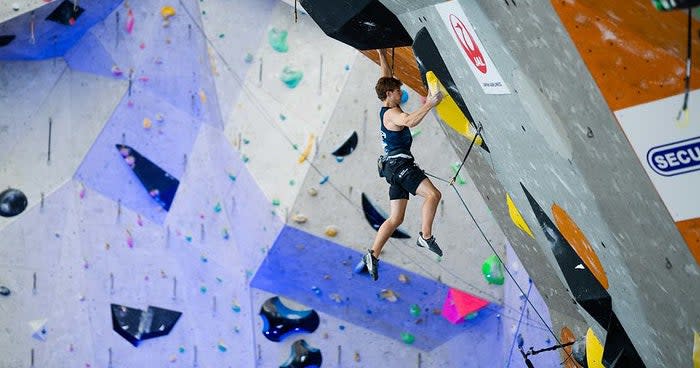
As the penultimate climber, Grupper set his sights on Roberts' high point of 30+ and employed noticeably more static beta through the reachy sections than the other climbers. Within a matter of minutes, Grupper excelled past Roberts' score and took the lead. Grupper continued climbing through the highest section of the wall, landing a dyno to a crimp before topping the route and clipping the chains precisely as his allotted time ran out. Commentator Danaan Markey described Grupper's precise movement and perfect time management as "an absolute show," and ultimately it was good enough for a gold medal--Grupper's second of the season. Potocar climbed last but fell while trying to latch a left-hand reach at the 32nd hold, a valiant effort that earned him the silver medal.
Mori and Garnbret continue their rivalry
As stated at the outset, the women's Lead division came with a lot of questions, but the qualification round did little to provide many answers: six competitors, including Janja Garnbret and Ai Mori, reached the top of both qualification routes. Fortunately, the semi-finals resulted in better separation, largely due to the sheer length of the route--more than 58 scored moves--and the attrition prompted by a bouldery roof section. Still, Mori managed to fight the pump and reach the top, as did South Korea's Chaehyun Seo. Garnbret reached the top and clipped the chains too, but it was later deemed that she had timed out at the 58th hold.
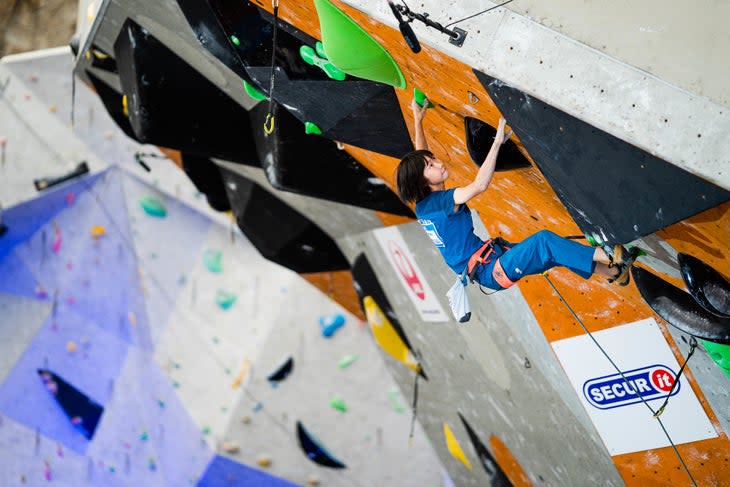
In the climactic finals, Japan's Ryu Nakagawa and Austria's Jessica Pilz both failed to latch a sidepull dyno to the 29th hold, revealing the route's lowest crux. Team USA's Natalia Grossman and Japan's Natsuki Tanii utilized controlled toe-hooks and static beta to beat that crux and motored 10 scored holds higher, finishing with identical scores of 38+. But the showdown between Mori and Garnbret, as something of a rematch from the previous weekend's World Cup, loomed and prompted an audible hush inside the Edinburgh International Climbing Arena.
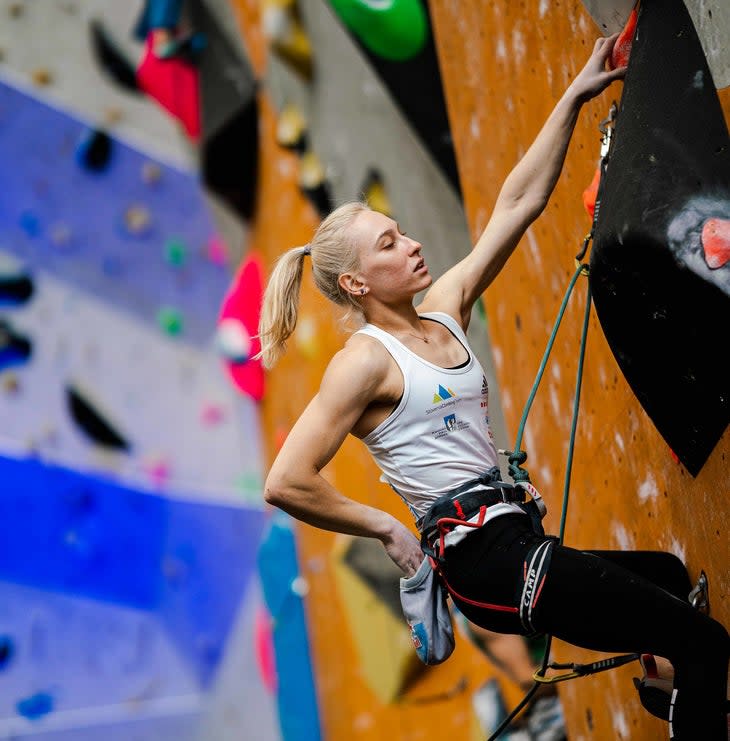
Garnbret climbed first and gritted through the lower side pull crux before entering an upper section of orange edges. She pinched and pulled through those as well, reaching the top of the route with only 20 seconds of her allotted time remaining. It was a masterful performance, bettered only by Mori's attempt moments later. Mori, too, bested the route's lower crux and even picked up the pace in the route's upper sequences before reaching the top--and pushing Garnbret down the scorecards based on countback to the previous round. South Korea's Chaehyun Seo climbed last but timed out before reaching the top, thus solidifying the podium: Mori as the gold medalist, Garnbret with the silver (and, as a result, the overall 2022 Lead season title), and Seo with the bronze.
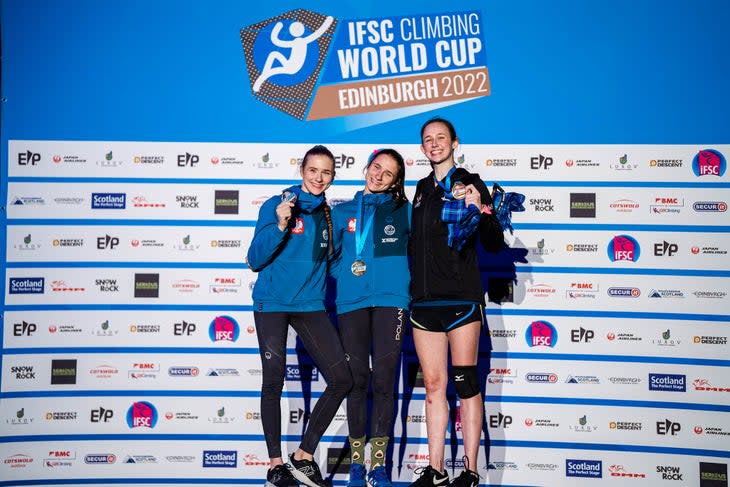
Results
Men’s Lead
Jesse Grupper (USA)
Luka Potocar (SLO)
Toby Roberts (GBR)
Stefan Scherz (AUT)
Masahiro Higuchi (JPN)
Sascha Lehmann (SUI)
Colin Duffy (USA)
Yoshiyuki Ogata (JPN)
Women’s Lead
Ai Mori (JPN)
Janja Garnbret (SLO)
Chaehyun Seo (KOR)
Natsuki Tanii (JPN)
Natalia Grossman (USA)
Jessica Pilz (AUT)
Ryu Nakagawa (JPN)
Eliska Adamovska (CZE)
Men’s Speed
Samuel Watson (USA)
Jinbao Long (CHN)
Erik Noya Cardona (ESP)
Women’s Speed
Aleksandra Kalucka (POL)
Natalia Kalucka (POL)
Emma Hunt (USA)
For exclusive access to all of our fitness, gear, adventure, and travel stories, plus discounts on trips, events, and gear, sign up for Outside+ today.

